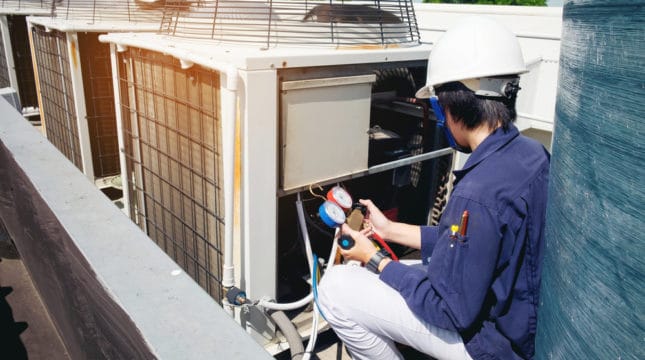Do you need a South Carolina HVAC license to work?
Yes. You need a license in South Carolina to work as an HVAC contractor. The South Carolina Department of Labor, Licensing and Regulation (LLR) issues two contractor licenses:
- Mechanical Contractors: For individuals working on commercial projects over $10,000. Issued by the Contractor’s Licensing Board.
- Residential HVAC Contractors: The Residential Builders Commission oversees residential contractors working on projects over $500.
These licenses should not be confused with the HVAC certifications issued by the Municipal Association of South Carolina (MASC). They certify mechanical trade categories and issue three types of certifications for HVAC professionals:
- HARV (Master Mechanical): Qualified to install, maintain, repair, alter or extend air conditioning, refrigeration, heating, and ventilation systems.
- Journeyman Unlimited Air Conditioning: Qualified to install, maintain, repair, fabricate, alter or extend air conditioning, refrigeration, piping vessels, warm air heating, low-pressure boilers, ventilation systems, duct systems, insulation and related systems.
- Residential HVAC: Qualified to perform residential HVAC work, including A/C and heat pump equipment, LP and natural gas.
Insurance requirements for a South Carolina HVAC license
HVAC contractor insurance helps to protect your business. While some of these South Carolina business insurance policies are not legally mandated, they are commonly purchased by business owners. Here are some typical options for small business coverage.
Workers’ Compensation insurance
South Carolina requires employers with four or more employees to have workers’ compensation insurance. The policy helps cover medical expenses for workplace injuries or occupational illnesses and partial wage replacement for those unable to work.
Learn more about workers’ compensation for contractors.
General Liability insurance
When work-related accidents happen, you can file a general liability claim. It can help cover your business from common risks and mishaps, such as property damage to someone else’s property or the medical expenses around injury to non-employees. It can also help protect against personal and advertising injuries.
Learn more about general liability insurance for contractors.
Commercial Property insurance
Commercial property insurance can help protect your work building structure, products and inventory, furniture and equipment you use for work. Whether you rent or own your property, this coverage helps protect against mishaps such as fire or theft.
Business Owner’s Policy
A business owner’s policy, or BOP insurance, provides broad coverage of general liability and commercial property policies combined in a single, more cost-efficient bundle. It helps cover damage that you or your employees may inadvertently cause to another person’s property and helps protect your business inventory in the event of a fire or other covered event.
Tools and Equipment insurance
When working in HVAC, your most valuable assets are your tools, equipment and parts. Tools and equipment insurance can help cover stolen, damaged or lost work equipment.
Commercial auto insurance
Commercial auto insurance can help if you drive a vehicle for work. It can cover accident-related repairs and even towing. Personal auto insurance may not cover business-related driving, so check with your insurer.
In SC, all drivers must be insured. Minimum coverage amounts are:
- $25,000 per person for bodily injury and $50,000 per accident
- $25,000 for all property damage per accident
South Carolina contractor surety bond requirements
In South Carolina, HVAC contractors must provide proof of a surety bond. A surety bond functions similarly to insurance but with a key difference. By obtaining a bond, you pay a fee to back up your commitment to a client. If you fail to complete the job, the bond issuer will compensate the client up to a set amount. Read more about contractor surety bonds.
The required bond amounts range from $10,000 to $350,000, based on the scope and scale of the projects you take on.
How to get an HVAC license in South Carolina
South Carolina requires different licenses for HVAC technicians depending on the scope of work. Here’s an overview of key South Carolina HVAC license requirements:
MASC certifications
Journeyman certifications require 4,000 hours (two years) of work experience supervised by a journeyman or master of the trade. If you have a two-year associate degree from a trade school, that can count as one year of experience.
On the other hand, to get a master-level certification, you need 8,000 hours (four years) of experience as a journeyman. Two of those years must be supervised by a qualified HVAC master. If the applicant has 10 years of documented experience in the trade, the journeyman
requirement can be waived.
All levels of certification require you to pass a licensing exam administered by Prov. All HVAC examinations are open-book and timed.
Residential specialty contractor HVAC license requirements
Residential contractors must submit the following:
- Start an online application, and alternatively, you can use a paper application form
- Pay a license fee
- Provide a copy of a government-issued ID: a driver’s license, state-issued ID, passport or military ID
- Include a copy of a social security card
- A notarized verification of a lawful presence form
- Employment verification or similar experience verification
- Transcripts of relevant education and training
- Credit report
- Proof of a surety bond for $5,000
To complete the application process, you must pass two HVAC license exams (Business & Law, Technical) administered by PSI. You must score 70% to pass.
Mechanical contractor license requirements (commercial contractors)
Depending on your license group (based on net worth / working capital), you may need to provide a financial statement or surety bond.
Like South Carolina residential HVAC contractors, mechanical contractors must pass two contractor exams (Business & Law, Technical) to proceed with the application process. PSI administers the HVAC exam; you must score 70% to pass.
EPA 608 Certification
To work with refrigerants in HVAC systems, you must earn the EPA 608 certification. This federal requirement ensures the safe handling of ozone-depleting substances. The certification comes in four types: Type I (small appliances), Type II (high-pressure systems), Type III (low-pressure systems), and Universal (all systems).
To get certified, pass an exam covering safe refrigerant practices, environmental regulations and leak detection. Exams are offered by approved testing organizations, with study guides available. There is no renewal requirement, so once certified, it lasts a lifetime.
South Carolina HVAC license reciprocity
Licensed HVAC contractors from other states may bypass the registration process and exams required in South Carolina. This is possible due to the state’s reciprocity agreements with certain other states:
- Alabama
- Georgia
- Louisiana
- North Carolina
- Ohio
- Tennessee
- Texas
Additionally, the LLR has reciprocity agreements with MASC.
Renewal requirements for South Carolina licenses
In South Carolina, HVAC license renewal requirements vary based on the type of license held. Below is an overview of renewal schedules for each license type:
- Journeyman certification (MASC): Expires annually
- Master certification (MASC): Expires every two years
LLR contractor licenses expire every two years.
- Residential contractor: Expires every two years on June 30 of odd-numbered years
- Mechanical contractor: Expires every two years on odd-years. You need to provide a financial statement or surety bond
There are no continuing education course requirements for this license.





